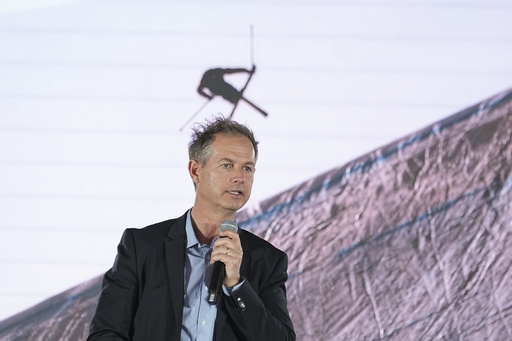
LYON, France — In a significant move towards the 2030 Winter Olympics, French organizers presented their planning team on Tuesday, just five years ahead of the prestigious event. This timeline marks the most condensed preparation period for any modern Olympics. The challenge lies in integrating snow sports and sliding venues in the mountainous regions with skating and curling facilities located along the picturesque coastline of Nice.
The bid for the games, which had been hastily assembled in 2023, received approval from the International Olympic Committee (IOC) in July, coinciding with the successful conclusion of the Summer Games in Paris. This approval came with a unique allowance for the organizing committee to delay receiving guarantees from the national government, providing them additional time to finalize their plans.
Leading the project is Edgar Grospiron, a former freestyle skiing gold medalist from the 1992 Winter Games held in France. Grospiron was appointed as the president of the organizing committee just days before this announcement. He emphasized the importance of executing the plans effectively, stating at a well-attended launch event held at the stadium of Lyon’s soccer team, “It is crucial that we organize and deliver a Winter Games that is impeccable and irreproachable.”
During the event, political figures, including sports minister Marie Barsacq and former prime minister Michel Barnier, who supported the initiative last October, spoke about their commitment to the project. This backing from various levels of government remains critical, especially given the significant infrastructure still needed, including a new ice arena in Nice and a potential location for speed skating, which might be located in either Italy or the Netherlands.
Organizers are drawing on the successful experiences from the recent Paris Olympics to bolster their plans for the Winter Games. Historically, the IOC allocated seven years for such preparation, but with the prior experience in Paris, organizers believe they can streamline the process. Consequently, Christophe Dubi, the IOC’s executive director of Olympic Games, highlighted, “We are not starting from zero,” underlining the advantage of leveraging established frameworks from Paris 2024.
The IOC began 2023 with a limited number of candidates ready to host the Winter Games in a financially viable and sustainable manner. Initially, a bid from Sweden, centered around Stockholm, seemed to be in a favorable position before the French proposal gained traction, aided by strong ties between the IOC, President Emmanuel Macron, and national Olympic representatives.
France’s successful bid for the 2030 Winter Olympics was announced in Paris on the same day that Salt Lake City was awarded the 2034 Winter Games, giving them four additional years for planning. The French Olympic body’s leader, David Lappartient, who is also a candidate for the upcoming IOC presidency, noted France’s historical significance in the Olympic movement, citing its previous hosting of three Summer and three Winter Games.
The organizing committee has set a conservative operational budget of 2 billion euros (around $2.1 billion), with officials emphasizing the need for financial prudence throughout the planning process. Another critical focus is on addressing climate change and ensuring that both the Olympics and the following Paralympic Winter Games are sustainable.
“I would never claim that the games will solve all the world’s issues,” Grospiron stated, “but we can certainly play a role in advancing sustainability efforts.” This commitment to addressing environmental concerns was echoed by the head of the Provence-Alpes-Côte d’Azur region, Renaud Muselier, who underscored the necessity of tackling climate change with optimism rather than defeatism, as both attitudes could hinder progress.

